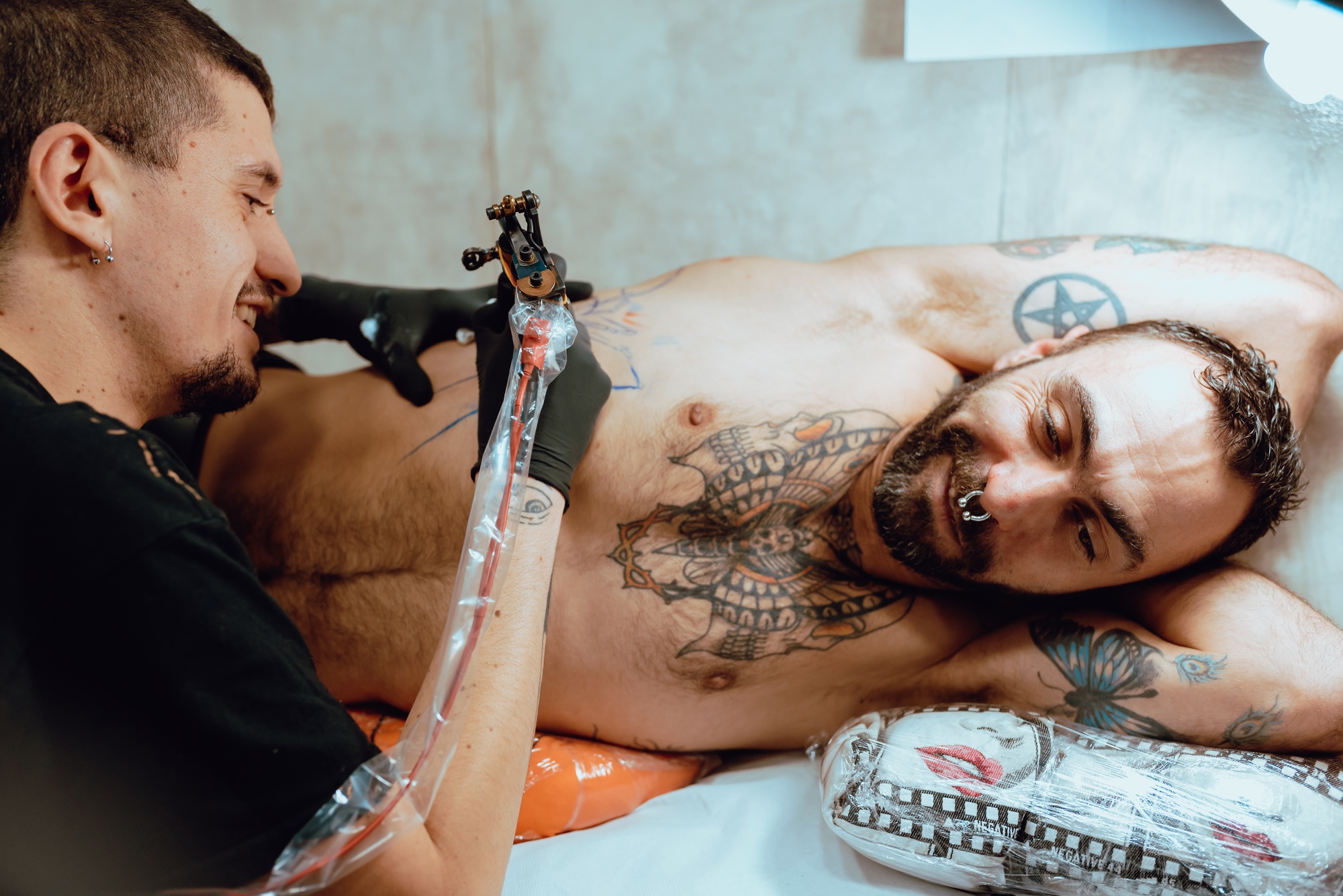Key Takeaways

- Understand the Industry: Familiarize yourself with current market trends and target audience demographics to effectively position your tattoo business.
- Create a Solid Business Plan: Outline your vision, including a clear executive summary, market analysis, and specific financial goals to ensure growth and sustainability.
- Comply with Legal Requirements: Obtain necessary licenses and permits, and adhere to health and safety regulations to maintain compliance and protect your business reputation.
- Establish an Inviting Workspace: Choose a high-traffic location, design a welcoming studio, and invest in quality equipment to enhance client comfort and artist productivity.
- Develop a Strong Marketing Strategy: Build an online presence through a professional website and social media, while actively networking in your community to attract a loyal client base.
Starting a tattoo business can be an exciting venture that combines creativity with entrepreneurship. If you’ve got a passion for art and a desire to help others express themselves, turning your love for tattoos into a thriving business might be the perfect path for you. With the tattoo industry booming, now’s the time to dive in and make your mark.
But where do you begin? From honing your skills to understanding the legal requirements, there’s a lot to navigate. Whether you’re a seasoned artist or just starting out, this guide will walk you through the essential steps to launch your tattoo business successfully. Get ready to transform your passion into a profitable enterprise and create a unique space where art and self-expression come together.
Understanding The Tattoo Industry

The tattoo industry presents unique opportunities for small business owners. Understanding key components of this industry is vital for your startup’s success.
Market Trends
Market trends show steady growth in demand for tattoo services. In 2022, the global tattoo market was valued at approximately $3 billion, with a projected annual growth rate of 5-10% up to 2030. Popular styles include traditional, realism, and abstract tattoos, often influenced by social media platforms. Keeping up with evolving trends and styles can attract a steady stream of clients. Additionally, the rise of tattoo conventions and collaborations with influencers offers avenues for expanding your business reach.
Target Audience
Identifying your target audience is essential for tailoring services. Your clients often range from 18 to 40 years old, with a growing interest among women. Many clients seek custom designs that reflect personal stories or cultural backgrounds. Understanding their preferences helps you create a welcoming environment and promote your small business effectively. Engaging with your audience through social media and local events strengthens community ties and fosters brand loyalty.
Essential Business Planning Steps

Successful small business growth in the tattoo industry relies on effective planning. Focus on detailed strategies to ensure your startup stands out in a competitive market.
Creating A Business Plan
A solid business plan outlines your vision for success. Include the following components:
- Executive Summary: Provide an overview of your tattoo shop, including your mission statement, target market, and financial projections.
- Company Information: Describe your tattoo studio’s location, services, and unique selling proposition to differentiate yourself from competitors.
- Market Analysis: Analyze industry trends, customer preferences, and competitors. Identify what sets your services apart and how you can meet market demands effectively.
Setting Financial Goals
Establishing financial goals is vital for tracking your progress. Define specific targets, such as:
- Startup Costs: Calculate total expenses for equipment, studio space, and marketing strategies.
- Revenue Projections: Set monthly income targets based on expected customer volumes and pricing. Adjust these figures as you analyze market performance.
- Profit Margin Goals: Determine realistic profit margins to ensure your business remains sustainable while delivering quality services.
Focusing on these business planning steps lays a strong foundation for your tattoo shop and ensures you’re well-prepared to navigate the industry.
Legal Requirements

Starting a tattoo business requires adherence to specific legal and licensing requirements. Understanding these regulations ensures compliance and promotes a successful startup.
Licensing and Permits
Obtain the necessary licenses and permits to operate your tattoo shop legally. Common requirements include a general business license, seller’s permit, zoning permit, and health department permits. Specific regulations vary by location, so check with your local government agency, such as the Secretary of State or County Clerk’s office, for precise requirements. Failure to acquire these licenses can lead to fines or even closure of your business.
Health and Safety Regulations
Complying with health and safety regulations is crucial in the tattoo industry. Each state mandates specific health standards, often governed by the local health department. Typical requirements include regular sanitation procedures, proper waste disposal methods, and maintaining sterile equipment. Investing in training for yourself and your staff in bloodborne pathogens and infection prevention is essential for maintaining compliance and ensuring client safety. Engaging with health regulations safeguards your reputation and demonstrates professionalism to potential clients.
Setting Up Your Workspace

Setting up your workspace is crucial in establishing a successful tattoo business. Focus on creating an environment that enhances comfort and promotes professionalism for both clients and artists.
Choosing A Location
Choosing the right location influences your visibility and client base. Opt for areas with high foot traffic, such as commercial districts or near shopping centers. Ensure the space complies with local zoning laws. Consider demographics; proximity to your target audience, primarily individuals aged 18 to 40, can significantly boost your chances for success. Analyze nearby competition to determine how to differentiate your services.
Designing Your Studio
Designing your studio involves creating a functional and aesthetically pleasing space. Invest in a top-quality tattoo client chair that is adjustable and ergonomic to provide comfort during lengthy sessions. Select an adjustable, ergonomic artist stool to support your own comfort and prevent back pain.
Incorporate a robust workstation with ample drawers and compartments to keep tools organized. Stainless steel surfaces are ideal for ease of cleaning and sterilization, which aids in compliance with health and safety regulations.
Essential equipment includes tattoo machines (coil or rotary), a stable power supply with adjustable voltage controls, and a variety of sterile needles and cartridges. Stock other necessary supplies such as spray bottles, latex gloves, paper towels, and tattoo supply stations to maintain a clean, professional environment. Prioritizing these factors creates a space conducive to high-quality work and client satisfaction, essential for any small business startup.
Marketing Your Tattoo Business

Marketing plays a vital role in growing your tattoo business. A strategic approach can attract clients and build a loyal customer base.
Building An Online Presence
Establish a robust online presence. Create a professional website showcasing your portfolio, services, and contact information. Utilize SEO strategies to enhance visibility in search engines. Engage actively on social media platforms like Instagram, Pinterest, YouTube, and TikTok, which excel in visual storytelling. Post regularly with high-quality images of your work to draw in followers. Collaborate with local influencers for wider reach; their audiences can significantly enhance your visibility. Using affiliate marketing can also promote your tattoo shop to potential new customers.
Networking and Community Engagement
Network actively within your community. Attend local events, art conventions, and tattoo expos to connect with other artists and potential clients. Building relationships strengthens your brand reputation and fosters community ties. Offer promotions like discounted “artist’s choice” tattoos to incentivize new clients and group bookings. Creating a package deal for friends encourages clients to share their experiences. Engaging in charity events or local fundraisers showcases your dedication to the community and elevates your profile as a small business owner.
Conclusion

Starting a tattoo business is an exciting journey that blends creativity with entrepreneurship. By following the steps outlined in this article, you can carve out your niche in a thriving industry. Focus on building your skills and understanding the legal requirements to ensure a solid foundation for your venture.
Creating a welcoming and professional environment will attract clients and keep them coming back. Remember to leverage social media and community engagement to build your brand and connect with your audience. With passion and dedication, you can turn your love for tattoos into a successful business that celebrates art and self-expression. Embrace the challenge and watch your dream take shape.
Frequently Asked Questions

What are the key steps to starting a tattoo business?
Starting a tattoo business involves several key steps: develop your tattoo skills, create a solid business plan, obtain necessary licenses and permits, find an ideal location, and invest in essential tattoo equipment. Additionally, build a strong online presence and engage with your target audience to create a loyal client base.
What skills do I need to become a tattoo artist?
To become a successful tattoo artist, you should have strong drawing skills, creativity, and a solid understanding of human anatomy. Additionally, it’s essential to learn techniques related to tattooing, including sanitation practices, to ensure client safety and satisfaction.
Do I need a license to start a tattoo business?
Yes, you typically need specific licenses and permits to operate a tattoo business, which can vary by location. It’s crucial to research local regulations and ensure compliance to avoid fines or potential closure.
How can I determine my target audience for a tattoo business?
To identify your target audience, consider demographics like age, gender, and interests. The tattoo industry is primarily popular among individuals aged 18 to 40, with increasing interest from women. Conducting market research can help tailor your services effectively.
What marketing strategies work best for a tattoo business?
Effective marketing strategies include establishing a professional website, engaging actively on social media platforms like Instagram and TikTok, and networking within the community. Attend local events, collaborate with influencers, and consider promotions to attract new clients.
What are the startup costs for a tattoo business?
Startup costs for a tattoo business can vary significantly based on location and studio setup. Key expenses may include equipment, licenses, rent, marketing, and insurance. It’s important to create a detailed financial plan to estimate these costs accurately.
How important is client engagement for a tattoo business?
Client engagement is crucial for building a loyal customer base. Engaging through social media, responding to feedback, hosting events, and collaborating with local businesses can enhance visibility and create strong community ties, ultimately fostering loyalty.
What is the growth potential of the tattoo industry?
The tattoo industry has shown steady growth, valued at approximately $3 billion in 2022, with projections of a 5-10% annual increase through 2030. Staying updated on trends will help attract clients and sustain your business.
Image Via Envato: peus80, gpointstudio, ADDICTIVE_STOCK, KostiantynVoitenko, MatHayward, Pressmaster, Rawpixel, LightFieldStudios



